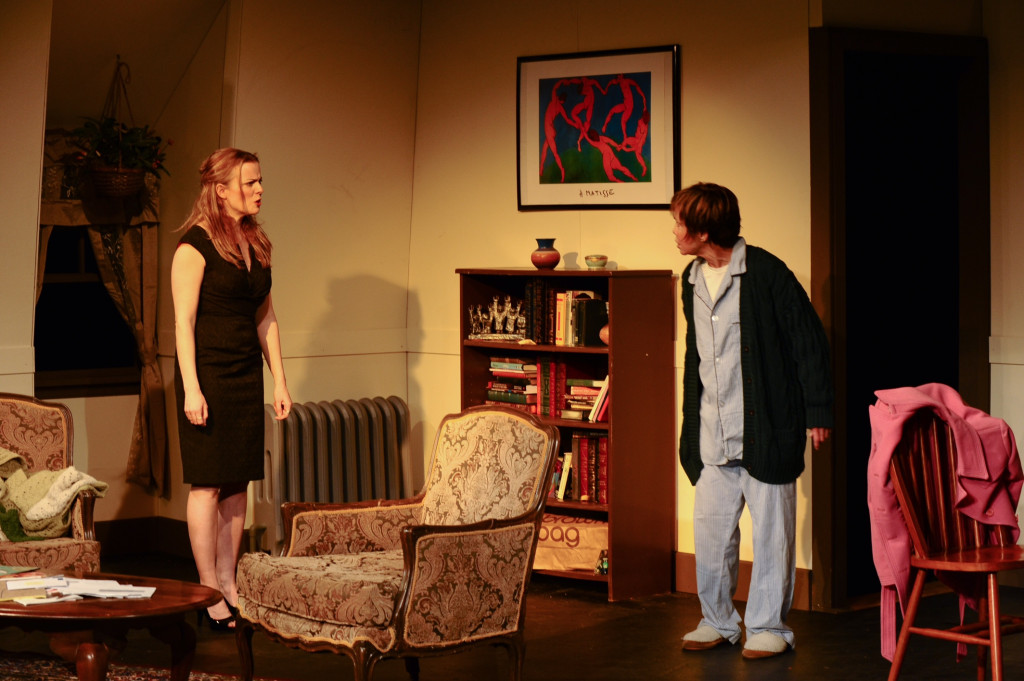
I have seen many performances of Donald Margulies’s shocking intergenerational encounter COLLECTED STORIES. I was in awe of the late Lynn Redgrave as Ruth Steiner and Karina Mackenzie as her protégée at the Grand Opera in Wilmington, DE in 2004. However, a few days ago, I witnessed an even more brutal performance with Renee Weisband as the aging professor and Kirsten Quinn as her enthusiastic graduate student at the Walnut Street Theatre Studio 5.
COLLECTED STORIES portrays Ruth Steiner, a bright Jewish professor devoted to her craft. In her drive to become a better writer and professor she gave up any private life, except for a secret affair many decades ago with the Delmore Schwartz, a famous and handsome poet and womanizer. This taboo subject in her life is one that she only talked about once, with her graduate assistant Lisa Morrison.
Steiner tells her eager student, “In my writing I try to tell the truth. Telling the truth means being as unstintingly specific as possible, for in the specific lies the universal.” Little does she realize that the day would come when her protégée would take that advice and tell the truth—lifting the mothballed veils of secrecy Professor Steiner had draped over her torrid past when she was a young, inexperienced woman.
Playwright Margulies described that situation—the center of his 1996 play—as a universal phenomenon: “Most people have felt betrayed or committed betrayal, deliberately or unknowingly.” In the mid-1960s, Jerzy Grotowski, the great Polish theatre director, revealed that “Young artists wish for inspired moments. And you find them; you take them; eager artists are bandits. Theatrical moments arrive, and you grab. Good! You know it will draw attention to you. But you aim to be more than bandits, no?” (quoted by Keith Fowler, “Student Assistant to Jerzy Grotowski Reveals Secrets From Inside the Lab.”)
Margulies described the “incredibly complex and conflicted relationship [between Ruth and Lisa]. There is a surrogacy involved, and there is a kind of mutual narcissism that I think exists in the mentor / protégée relationship, where each sees the reflection of herself in the other. Those reverberations for me have always been of great interest.”
In COLLECTED STORIES, the worlds of Ruth Steiner, the writer and professor, and Lisa Morrison, her graduate student and aspiring writer, clash in numerous ways—generational differences, jealousies, artistic license, and betrayal. Both Weisband and Quinn see the reflection of themselves in the other, a riveting performance with a role reversal that hits the audience hard.
Since 2003, Weisband, founding director of ISIS Productions and actor in many a Jewish-themed play, (including Broken Glass, which I reviewed) has gone all out to present some of the most thought-provoking plays in the Philadelphia area. Her Professor Steiner feels existentially threatened; Weisband acts with the power of a lioness caught in a trap from which there is no escape. Her voice reaches a sharpness and hits a volume that pierced my ears and my soul with full force.
Kirsten Quinn plays Lisa Morrison with gushing enthusiasm at first, leading to a growing awareness of her own powers. Morrison has grown by leaps and bounds as a result of her studies and her work with her professor, and then does something that shatters her aging mentor.
Literary scandal
Many years ago, I met poet and novelist Stephen Spender in London, and had a wonderful conversation with him about his time in Berlin, when the Nazis took over in 1933. I had forgotten this meeting with the sensitive and sophisticated author until I discovered his now-famous letter to the New York Times (Sept. 4, 1994), in which he accused American novelist, David Leavitt, of plagiarizing Stephen’s 1951 novel World Within World, especially its “literary structure, character development, dialogue and plot” in his 1993 novel, While England Sleeps.

Margulies read about the literary Leavitt –Spender scandal and felt inspired to make the theme of betrayal and plagiarism the center of COLLECTED STORIES. As he sees himself as “a collagist in [his] work,” he created a riveting work, which shows a wide range of experiences, values, ambitions, by an up-and-coming young writer and an established professor of English who no longer is willing to push boundaries in her own life.
The pain of that sense of betrayal, which Spender felt so acutely, and which led to a law case where Viking Penguin, the publishers, instead of paying millions of dollars, destroyed all copies still in the warehouse, became the impetus for a masterpiece that has been performed widely, not only in the English speaking world, but around the globe. Margulies explained, “I think COLLECTED STORIES has traveled well because its themes cross cultures. Mentors and protégés exist everywhere.”
COLLECTED STORIES, waiting to be told
Shaken by the powerful performance of two Philadelphia actors in one of the most thought-provoking plays, I did not take the elevators, but walked all the way from the fifth floor of Studio 5 at the Walnut Street Theatre down the steep steps, through the lobby, into an ice-cold night, hit not only by the wind and the weather, but by many questions about the stories in my life that I have not published like Ruth Steiner, and the many stories that I know about people in my family, and among my friends—all waiting to be told. [Walnut Street Theatre, Studio 5, 825 Walnut Street] March 5-29, 2015; isisperforms.com.
- Read another Phindie review of COLLECTED STORIES.
